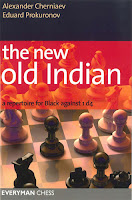Everyman Chess
Rating: -
Author: Alexander Cherniaev, Eduard Prokuronov
Pages: 160 pages
Publisher: Everyman Chess, 2011
Language: English
ISBN - 13: 978-1-78194-232-1
The Old Indian Defence is considered to be a sound way for Black to meet 1 d4. Some might argue that it is steady rather than spectacular, but is this reputation totally deserved?
Grandmaster Alexander Cherniaev strongly disagrees, and in this book he has re-examined this ancient opening and the result is a "new" Old Indian.
In this modern interpretation, he has introduced ambitious and aggressive ways for Black to play in the main lines. He constructs an improved version of a repertoire he has himself utilized with great success against grandmaster opposition.
Using illustrative games, he studies the fundamental tactical and positional ideas for both sides, and also covers what to do if White avoids the Old Indian. This book tells you everything you need to know about playing the New Old Indian.
• A Grandmaster’s repertoire against 1.d4
• Full of new ideas and critical analysis
• Illustrative games highlight key ideas
Alexander Cherniaev is a Russian Grandmaster, journalist and author. He's a very experienced player and has enjoyed numerous tournament successes, including winning the silver medal at the Moscow Championship and competing in the prestigious Hasting Premier Tournament.
Eduard Prokuronov is a FIDE Master and a many-time Champion of the Arkhangelsk region of Russia.
"Now my interest in the Old Indian has been given an extra, fresh boost by GM Alex Cherniaev's excellent new Everyman book, “The New Old Indian". It's choc-full of original ideas."
"By organizing the material around model games and plenty of prose the authors have made The New Old Indian accessible to a wide range of players from 1800 to 2400. It doesn't hurt that the proposed repertoire is not theoretical by today's standards nor does it lead to excessive simplification - the one exception 1.d4 Nf6 2.c4 d6 3.Nc3 e5 4.dxe5 dxe5 5.Qxd8+ Kxd8 is still quite rich in possibilities for both sides. Recommended."
Grandmaster Alexander Cherniaev strongly disagrees, and in this book he has re-examined this ancient opening and the result is a "new" Old Indian.
In this modern interpretation, he has introduced ambitious and aggressive ways for Black to play in the main lines. He constructs an improved version of a repertoire he has himself utilized with great success against grandmaster opposition.
Using illustrative games, he studies the fundamental tactical and positional ideas for both sides, and also covers what to do if White avoids the Old Indian. This book tells you everything you need to know about playing the New Old Indian.
• A Grandmaster’s repertoire against 1.d4
• Full of new ideas and critical analysis
• Illustrative games highlight key ideas
Alexander Cherniaev is a Russian Grandmaster, journalist and author. He's a very experienced player and has enjoyed numerous tournament successes, including winning the silver medal at the Moscow Championship and competing in the prestigious Hasting Premier Tournament.
Eduard Prokuronov is a FIDE Master and a many-time Champion of the Arkhangelsk region of Russia.
"Now my interest in the Old Indian has been given an extra, fresh boost by GM Alex Cherniaev's excellent new Everyman book, “The New Old Indian". It's choc-full of original ideas."
Paul Motwani, The Scotsman
"This is a fascinating book...***** (out of 6)"
Carsten Hansen, ChessCafe.com"By organizing the material around model games and plenty of prose the authors have made The New Old Indian accessible to a wide range of players from 1800 to 2400. It doesn't hurt that the proposed repertoire is not theoretical by today's standards nor does it lead to excessive simplification - the one exception 1.d4 Nf6 2.c4 d6 3.Nc3 e5 4.dxe5 dxe5 5.Qxd8+ Kxd8 is still quite rich in possibilities for both sides. Recommended."
John Donaldson
Solidfiles
Gdrive
password:tbys

No comments:
Post a Comment